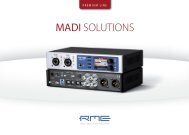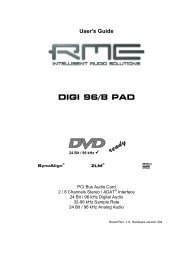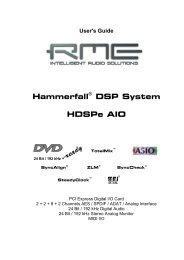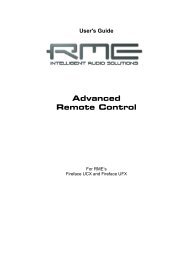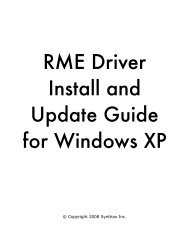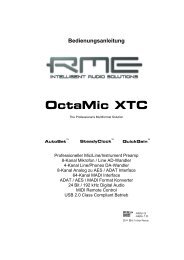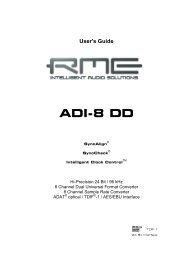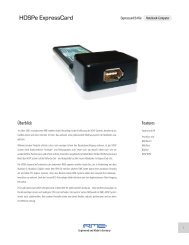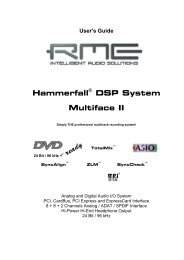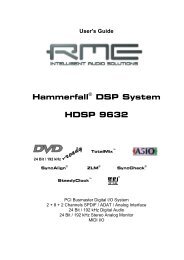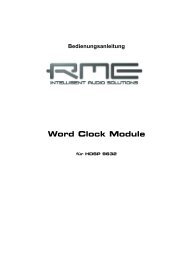Create successful ePaper yourself
Turn your PDF publications into a flip-book with our unique Google optimized e-Paper software.
10.4 Firmware Update<br />
The Flash Update Tool updates the <strong>HDSP</strong> <strong>AES</strong>-<strong>32</strong> to the latest firmware version. It requires an<br />
already installed driver.<br />
Start the program madi_aes_fut.exe. The Flash Update Tool displays the current revision of<br />
the <strong>HDSP</strong> <strong>AES</strong>-<strong>32</strong>, and whether it needs an update or not. If so, then please press the 'Update'<br />
button. A progress bar will indicate when the flash process is finished. The bar moves slowly<br />
first (program), then faster (verify).<br />
If more than one interface card is installed, all cards can be flashed by changing to the next tab<br />
and repeating the process.<br />
After the update the PCI card need to be resettet. This is done by powering down and shutting<br />
off the PC. A warm boot is not enough!<br />
When the update fails (status: failure), the card's second BIOS will be used from the next cold<br />
boot on (Secure BIOS Technology). Therefore the card stays fully functional. The flash process<br />
should then be tried again on a different computer.<br />
Note: Because of the changed hardware revision, Windows 2000/XP will start the hardware<br />
assistant and wants to install new drivers. Do NOT let Windows search for new drivers, but<br />
follow the instructions given in chapter 10.2.<br />
11. Configuring the <strong>HDSP</strong> <strong>AES</strong>-<strong>32</strong><br />
11.1 Settings Dialog<br />
Configuration of the <strong>HDSP</strong> <strong>AES</strong>-<strong>32</strong> is done via its own settings dialog. The panel 'Settings' can<br />
be opened:<br />
• by clicking on the hammer symbol in the Task Bar's system tray<br />
The mixer of the <strong>HDSP</strong> <strong>AES</strong>-<strong>32</strong> (TotalMix) can be opened:<br />
• by clicking on the mixer icon in the Task Bar's system tray<br />
The hardware of the <strong>HDSP</strong> system offers a number of helpful, well thought-of practical functions<br />
and options which affect how the card operates - it can be configured to suit many different<br />
requirements. The following is available in the 'Settings' dialog:<br />
• Input selection<br />
• Configuration of digital I/Os<br />
• Synchronization behaviour<br />
• State of input and output<br />
• Current sample rate<br />
• Latency<br />
Any changes made in the Settings dialog are applied immediately - confirmation (e.g. by clicking<br />
on OK or exiting the dialog) is not required. However, settings should not be changed during<br />
playback or record if it can be avoided, as this can cause unwanted noises. Also, please note<br />
that even in 'Stop' mode, several programs keep the recording and playback devices open,<br />
which means that any new settings might not be applied immediately.<br />
The status displays at the bottom of the dialog box give the user precise information about the<br />
current status of the system, and the status of all digital signals.<br />
<strong>User's</strong> <strong>Guide</strong> <strong>HDSP</strong> <strong>AES</strong>-<strong>32</strong> © <strong>RME</strong> 13



